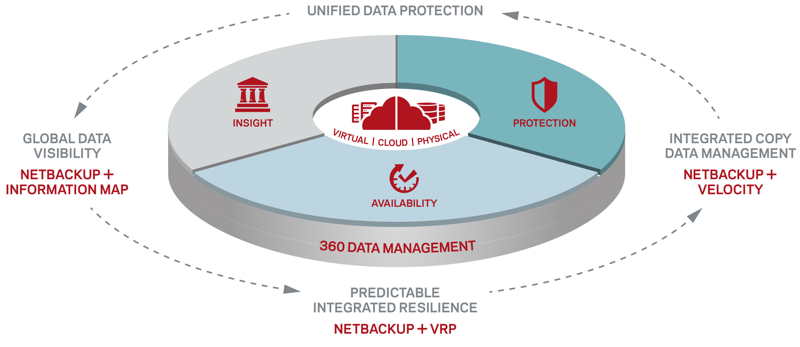Veritas Delivering 360 Data Management Capabilities on Microsoft Azure
From data protection and business resiliency to compliance and optimized storage, customers can capitalize on cloud experience.
This is a Press Release edited by StorageNewsletter.com on September 25, 2017 at 2:20 pmVeritas Technologies LLC announced an array of 360 data management capabilities for the company and Microsoft Azure customers.
These innovations empower customers to capitalize on the flexibility and agility offered by Azure, and benefit from data management capabilities powered by the company that help reduce costs and ensure compliance, increase visibility and simplify workload migration. Customers can extract more value from their data, which helps them achieve better business outcomes.
This announcement advances a strategic partnership between Microsoft Corp. and the firm and coincides with the rapid adoption of hybrid and public cloud environments.
According to Gartner, Inc., “the worldwide public cloud services market is projected to grow 18% in 2017 to total $246.8 billion, up from $209.2 billion in 2016.” (1)
However, as customers accelerate migration to the cloud, the need to manage data in the cloud has been more critical.
“Joint Veritas and Microsoft customers have the best of both worlds: the flexibility and agility of Azure cloud combined with the trusted toolset of the Veritas 360 data management platform,” said Mark Russinovich, CTO, Azure, Microsoft. “Customers can use these offerings to optimize for hybrid cloud environments as they get more value from their data.“
Delivering full spectrum of 360 data management capabilities for hybrid cloud
This announcement includes technology integration that enhance joint customers’ BC and disaster-recovery readiness, enable hybrid cloud scale-out storage optimization, and increase customers’ ability to visualize data across disparate sources.
Unless otherwise referenced, all of the integration listed below are available.
-
Business resiliency that is predictable and automated: With the Resiliency Platform (VRP), customers can monitor and failover/failback multi-tiered applications to and from Azure with a click. This enables organizations to use the cloud as a recovery target, increasing DR readiness while reducing the cost and complexity associated with on-premises facilities. Organizations can rely on VRP to provide predictable recoveries through automated and non-disruptive recovery testing.
-
Software-defined storage optimized for cost and high-performance: With the company’s Access, customers can automatically migrate old data to the cloud for cost-effective long-term storage, or mix on-premises and Azure cloud storage to create a single scale-out file system for efficient storage management with no disruption.
-
Data visibility that enables informed decision making: With the Information Map connector for Azure, customers can get a real-time picture of their unstructured data stored on Microsoft Azure Blob Storage and Azure File Storage. Once organizations know what data they have, they can make informed data retention, migration and deletion decisions. For example, customers can use insights provided by Information Map to minimize storage costs in the cloud by identifying obsolete data. Customers can determine which data must be preserved to help meet stringent compliance regulations like the General Data Protection Regulation. Information Map connectors will support a variety of other Microsoft and third party data sources. This integration with Azure will be available in the coming quarters.
Customers can take advantage of a host of other previously announced company’s data management offerings to enhance their experience on Microsoft Azure, whether they’re a large enterprise or a small to midsized business. Unless otherwise noted, these integrations are available.
Data protection optimized for cloud:
-
With NetBackup, the company’s unified data protection solution for the enterprise, customers can migrate and protect data stored on the Azure platform. As part of NetBackup 8.1, announced and available this quarter, customers can use deduplication technology to help reduce backup times and lower long-term storage costs. Customers can also leverage their NetBackup investment and backup and recovery infrastructure as a foundation to deliver 360 data management.
-
With Backup Exec, mid-sized and smaller businesses enjoy an integration with Azure for backup to, from or in the cloud. It provides a single platform and console across virtual, physical and cloud environments to optimize customers’ productivity and includes deduplication to Azure for improved performance with reduced cost.
-
With CloudPoint, customers can orchestrate Azure-based snapshots for quick recovery in the cloud. The CloudPoint interface provides a clean, central location from which they can manage snapshot operations across a variety of on-premises and cloud-specific technologies.
-
Workload migration that provides predictable outcomes: With CloudMobility, customers can safely and securely migrate complex workloads from their data center to the cloud of their choice-including Azure-with a click. It provides pre-migration testing, giving customers advance knowledge of how an application will perform in the cloud.
-
Archiving technology that is key to data retention: With Enterprise Vault, customers can use archiving technology to assign retention policies, do rapid search and streamline eDiscovery requests. Organizations can migrate archived content to Microsoft Azure Blob storage or transition from Enterprise Vault on-premises to Enterprise Vault running on Azure.
“The desire to incorporate Infrastructure as a Service (IaaS) into the enterprise IT strategy is abundantly clear,” said Mike Palmer, EVP and chief product officer, Veritas. “However, data management is critical to helping customers ensure compliance and protection of their data while extracting maximum value from it. That’s why this partnership has been so well-received by customers.“
(1) Source: Gartner, Inc., Press Release, Gartner says Worldwide Public Cloud Services Market to Grow 18% in 2017, February 22, 2017.
Resource:
360 Data Management for Microsoft














 Subscribe to our free daily newsletter
Subscribe to our free daily newsletter

